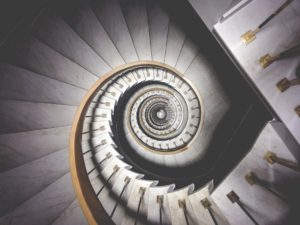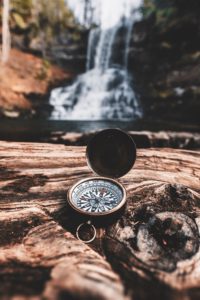Oxford Online Dictionary lists several meanings for integrity: “The quality of being honest …, the state of being whole and undivided, the condition of being unified …, internal consistency.” Integrity is an important piece of emotional intelligence. Like success, integrity is a quality we define for ourselves. If we don’t do so, the world is filled with people who will impose their idea of integrity upon us.

Integrity is not about optics. We’re all familiar with people who talk the talk but don’t walk the walk. Internal consistency and wholeness mean our words, actions, intentions, thoughts and feelings work together. Integrity is not flashy, sexy, loud, or the center of attention. It’s a quiet, steady reliability; a deliberate and focused intentionality.
Integrity is not by any means perfect, or a destination. It’s a daily practice. It holds us accountable and responsible for our choices.
From an emotional intelligence perspective, the practice of integrity begins with keeping our word to ourselves. It also requires authenticity, or honesty. It sounds simple, but when I first began thinking about integrity, I felt blank. Honesty, yes, I could get a handle on that. I don’t cheat or steal. That seemed to me a superficial look at integrity, however. I wanted to push deeper into it than cheating and stealing.
At the same time I was learning emotional intelligence, I was reading a book titled The Energy of Money by Maria Nemeth, Ph.D. Several pages are devoted to excavating one’s individual standards of integrity. It’s a fascinating and provocative exercise, starting with exploring who we pretend we are, who we’re afraid we are, and who we really are. Nemeth provides a series of exercises, at the end of which I had a 3 x 5 card with six to eight words or short phrases that seemed, at that point in time, to be the bare bones of my integrity.

Then I came to Maine and my whole life changed. For a long time, I felt myself to be in utter chaos. I still had the card with my standards of integrity on it, stuck in The Energy of Money like a bookmark.
Gradually, the dust settled. I stood up tall again and looked around me. I began to master emotional intelligence, transformed my health with a different way of eating, and wrote myself out of confusion, loss and my old life. I reread The Energy of Money, and the book, along with other resources, helped me heal my relationship with money. I put the card with my standards of integrity on my bulletin board in my work space, where I could look at it every day.
Then I encountered the idea of minimalism about a year ago. I gave up my habit of making lists, and lists of lists. I developed a practice of reverse listing — making brief daily notes about how I in fact do spend my time — rather than making long lists of what I HAVE to do or SHOULD do. I worked on feeling good about what I do accomplish instead of focusing on what I’m not accomplishing. I started to trust myself to the flow of each day and where my curiosity, creativity and standards of integrity led me.
Integrity does not provide me with a higher moral ground or a sense of righteousness. I don’t wear it like a medal. In fact, more often than not, it requires me to deal with life in ways I’d much prefer to avoid, like having difficult conversations with people, allowing myself to be seen and heard, or making hard choices and dealing with painful consequences.
Minimalism is, for me, largely about keeping it simple. One day I took my 3 x 5 card and started re-working my standards of integrity. I wasn’t happy with the language, and my life had changed a great deal since I had first written them.
I had changed a great deal.

For a couple of weeks I played around with words and ideas. I thought hard about what really matters to me in a week, a day, an hour. One of the basic tenets of minimalism is if everything is important, nothing is. What are the most powerful ideas guiding my choices, the absolute essential core of who I am in the world? What are my best tools for navigation through life?
When I was satisfied, I got a new 3 x 5 card, labeled it Standards of Integrity, and listed: authenticity, creativity, seeing it clear, and warriorship. I put it back on my bulletin board. These four simple standards are always with me, as I write, as I work, as I relax, and as I interact with others. I visualize them as a circle of four overlapping circles, connected, with no beginning and no end. If I’m groping in the dark, trying to see something clearly, I’m resisting and fighting denial, assumptions, arguing with what is, and my own not-so-useful internal narratives. That’s warriorship. I’m in pursuit of understanding and clarity about the places where I can learn, grow, and use my power effectively. That’s authenticity. I’m sharing and communicating honestly with others in my life about my needs, thoughts, experiences and ideas. That’s more authenticity and warriorship, along with creativity.
I rarely use one standard without employing the other three.
I’ve discovered these four standards make to-do lists redundant. As long as I’m living by the standards, what I’m actually doing is less important than my being. My current daily to-do list is the same simple items every single day: Eat well. Hydrate well. Exercise. Write. Keep it simple. Stay now. If I successfully accomplish those most important tasks, that’s what matters. On busy days, when I deal with a lot of other tasks, housework, or hours at work, I might complete a lot of productive activities, but if I haven’t addressed my own physical and emotional needs and written, I don’t feel good about the day and the way I spent it, because I didn’t keep my priorities straight. The next day, I try to refocus.

Developing personal standards of integrity is not some kind of a silver bullet. It doesn’t mean I float through life, confident, beloved by all (!!!), and never making a mistake. (I can’t even write that last sentence without giggling.) Most of the time, I feel like a hot mess. I’m constantly second-guessing myself. I’m rarely lost, though. My integrity is a compass, a way to ground and a place to start. Let’s face it: life is messy. We are all fallible and flawed, which is to say we’re all beautifully human.
I can’t make life less messy, but I can simplify my own life and the inside of my head. Developing standards of integrity is something of a hero’s journey because it requires us to take a long, hard, honest look at ourselves in relationship to not only money, but all the other things in our lives. For me, that journey was well worth taking.
© 2020 – 2022, Jenny Rose. All rights reserved.